Despite severe need and higher health risks, people with intellectual and developmental disabilities (IDD) are often denied health services and die on average 16 years sooner than the general population. When Special Olympics Washington athletes have access to needed health services and resources, they are able to get the most out of their sports performance, education, employment, and all other aspects of life.
Special Olympics Washington is improving the health of people with ID by collaborating with our athletes, healthcare providers, community organizations, universities, and governments to foster inclusivity. Inclusive health means people with IDD are able to take full advantage of the same health programs and services available to people who do not have IDD. Ensuring inclusive health at all levels gives Special Olympics Washington athletes the opportunity to reach their greatest potential on and off the competition field.
Special Olympics Washington is focused on the sustainable development of local programming that benefits everyone in the community. This means focusing on the organization and expansion of activities in diverse urban and rural communities to enable lifelong athlete involvement in quality sports as participants and leaders and actively promote healthy lifestyles and the inclusion of people with IDD.
Healthy Communities
The Healthy Communities program aims to provide year-round health and fitness opportunities to SOWA athletes through partnerships, fitness and wellness opportunities, and training ![]() healthcare professionals to provide inclusive health services.
healthcare professionals to provide inclusive health services.
By focusing on wellness opportunities, follow-up care, access, and education, SOWA and its partners are creating communities where athletes have every opportunity to reach their optimal health to perform at their best on the competition field.
Special Olympics Washington athletes and teams can take the next steps to become healthier and improve their athletic performance through our Healthy Communities Programs.
Visit Fitness & Wellness Programs Webpage
Fit 5 is based on three simple goals: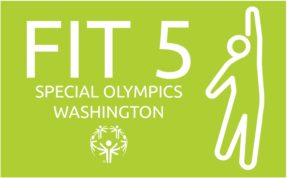
- Exercising 5 days per week
- Eating 5 servings of fruits and vegetables per day
- Drinking 5 water bottles of water per day
Fit 5 provides tips and information to lead a healthy lifestyle. Register your team for Fit 5 here!
Unified Fitness Clubs utilize activity trackers to develop healthy lifestyles: 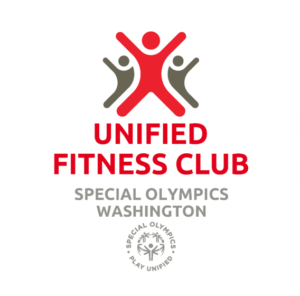
Clubs typically meet weekly and select activity types that suit the needs of their members. Walking is appropriate for all levels of fitness and is easy to access. Other fitness activities could include hiking, yoga, dancing, cycling, and strength training. Participants are motivated to stay active throughout the week by tracking progress on goals, typically with a pedometer or fitness tracker. Register your school for Unified Fitness Clubs here!
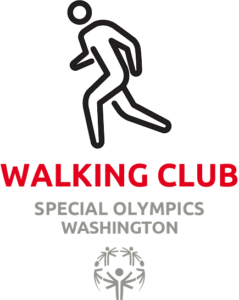 Walking Clubs bring together individuals with and without intellectual disabilities for non-competitive physical activity.
Walking Clubs bring together individuals with and without intellectual disabilities for non-competitive physical activity.
Walking Clubs provide the platform and opportunity for individuals to challenge themselves, establish friendships, and exercise. Walking Clubs can be led or co-led by SOWA coaches, athletes, and Unified Partners. Walking Clubs can take place during a traditional sports season or as a standalone club. Register your Walking Club here!
Healthy Athletes
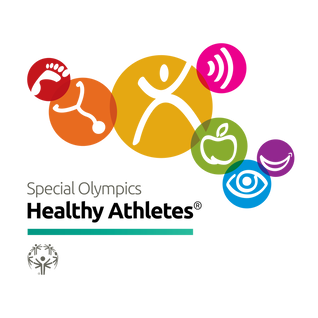
Healthy Athletes®is designed to help Special Olympics athletes improve their health and fitness, leading to enhanced sports experience and improved well-being. Special Olympics created its Healthy Athletes program in 1997 to identify and address the health disparities that people with intellectual and developmental disabilities (IDD) often experience. The program provides Special Olympics athletes with free health screenings, education, and referrals for follow-up care in a fun, welcoming environment that removes the barriers people with IDD often encounter during a visit to a doctor, dentist, or other healthcare professionals. The Healthy Athletes program is dedicated to changing the way health systems interact with people with intellectual disabilities. Healthy Athletes is not only a program for other athletes but, through training and hands-on experience at screenings, it is a program for healthcare students and professionals to increase their knowledge of best practices in caring for people with IDD.
Screenings are offered in eight different health areas:
Fit Feet (podiatry)
FUNfitness (physical therapy)
Health Promotion (better health and wellbeing)
Healthy Hearing (audiology)
MedFest (sports physical)
Special Olympics-Lions Clubs International Opening Eyes (vision)
Special Smiles (dentistry)
Strong Minds (emotional wellbeing)
Find a Healthy Athletes Screening Near You! Volunteer With Healthy Athletes! Become a Healthy Athletes Clinical Director! Explore Health Resources for Athletes!
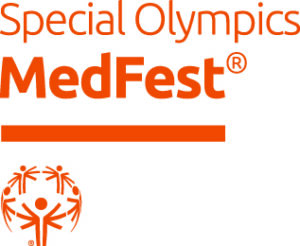
MedFest Resources:
Alliance for Inclusive Health
As of 2023, an estimated 170,000 people with IDD lived in Washington. However, many face elevated health risks and systemic inequities in addressing them due to stigma, exclusion, and inadequate access to qualified healthcare and support services. These challenges have led to a fifteen-year difference between the expected life spans of the general population and people with IDD.
The Alliance for Inclusive Health aims to bridge this gap with a multi-faceted strategy that focuses on education for providers and accessibility for those living with IDD as the basis for meaningful change. To that end, the Alliance will bring together a diverse set of partner organizations to foster collaboration, elevate the importance of inclusive health practices, and increase access to health programs. Click here to learn more about the Alliance.
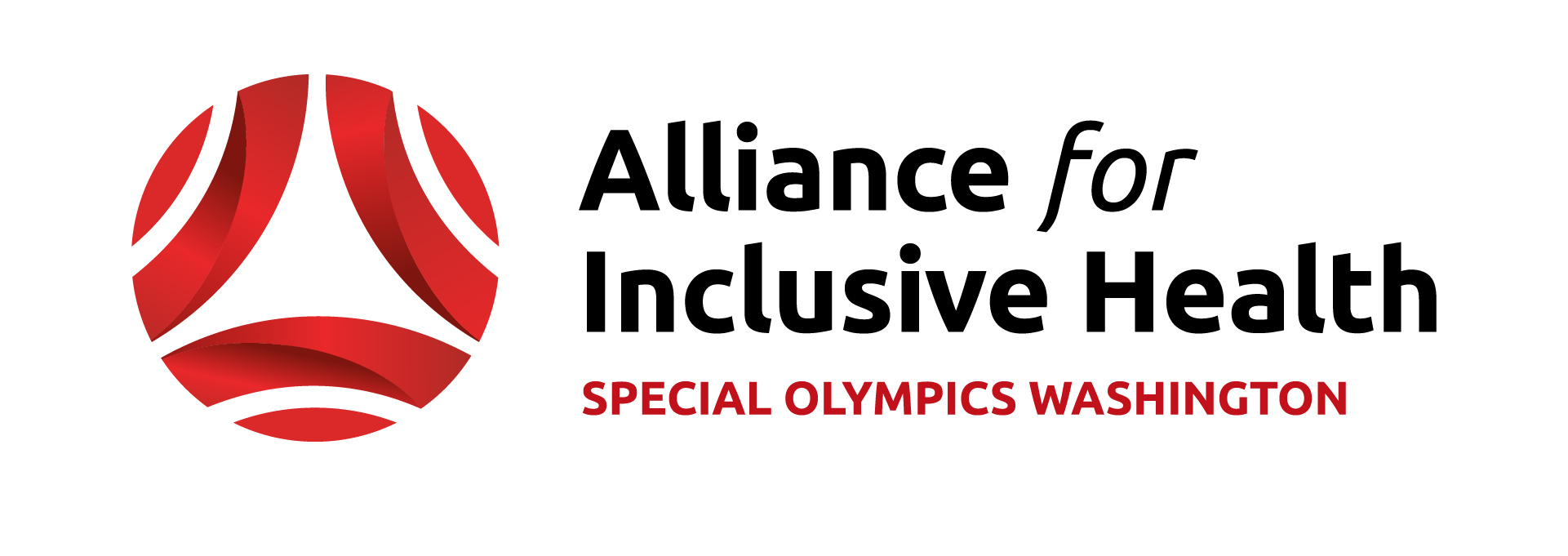
Inclusive Health Training:
For Health Professionals and Students
- STEP 1: Learn more about our Referral Network & benefits.
- STEP 2: Join our Referral Network by completing the Preferred Provider Interest Form.
- STEP 3: Take our free e-learning courses to learn best practices for providing quality healthcare for patients with IDD.
- STEP 4: Receive your Partner in Health window decal to display at your clinic or organization!
- Inclusive Health & Fitness Training Overview
Healthy Food & Beverage Guidelines
Special Olympics Washington has developed nutrition guidelines based upon the 2015-2020 Dietary Guidelines for Americans, which promote the principles of minimizing the use of processed foods, reducing sodium, decreasing sugary beverage intake, and emphasizing fruits, vegetables, and whole grains. Special Olympics Washington staff, volunteers, partners, and sponsors are asked to follow these guidelines for all competitions, sponsorship, events, and meetings.
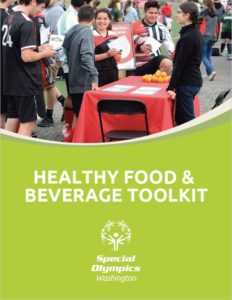
The toolkit is a resource for our community to use when:
- Seeking healthy sponsored or donated food for events.
- Working with caterers.
- Shopping for team snacks before practice and competitions.
- Setting up food stations at venues to make healthy choices the easy choices.
- Guiding athletes towards healthier options on the road.
- Meeting cultural and dietary needs.
The toolkit can be used as a single document or pages can be pulled and used individually as needed for specific projects or audiences.
Get the ToolkitLearn more about how we partnered with the Washington State Department of Health to create the Healthy Food and Beverage Guidelines.
Read the Success Story
Meet Our Healthy Athletes Clinical Directors
Fit Feet:
- Jeff Pentek, DPM – Virginia Mason Medical Center
- Vinai Prakash, DPM – Ankle and Foot Specialists of Puget Sound
FUNfitness:
- Matt Harnpadoungsataya, PT, DPT – Seattle Children’s
- Laura Johnstone, PT – University of Washington
Health Promotion:
- Cathy Armacost, RDN
- Julie Larsen, Ph.D., RDN, ACSM RCEP, Nutrition and Exercise Physiology Instructor – Washington State University Spokane
- Jenny Pang, MD – Kaiser Permanente
- Susanna Block, MD – Kasier Permanente
Healthy Hearing:
- Leah Martin, Pediatric Audiologist – University of Washington’s Center on Human Development and Disability
Opening Eyes:
- Michelle Carle, MD, Ophthalmologist – Kaiser Permanente
- Katie Hash, O.D. – Alderwood Vision Therapy Center
Special Smiles:
- Aarika D. Anderson Elter, DDS, Pediatric Dentist – Harbor Kids’ Teeth
- Cooper Bolak, DDS, Owner – Snohomish Modern Dentistry
- Ashland Doomes, DDS – University of Washington
- Kimberly Espinoza, DDS, MPH, Director, DECOD Program – University of Washington School of Dentistry
- Ara Greer DDS, PhD, Pediatric Dentist – Seattle Children’s Odessa Brown Children’s Clinic
- Donna Quinby, DMD, MSD, Pediatric Dentist – Seattle Special Care Dentistry
Strong Minds:
- Megan Gary, Psychiatrist – Kaiser Permanente
- Dave O’Neal, MS, LMHC, MHP, Director, IDD Services – Sound Health
Medfest:
- Becky Shwartz, MD – Renton Pediatrics
- Sherry Zhao, MD – Kadlec Tri-Cities Cancer Center
Resources
Special Olympics Washington Healthy Food & Beverage Toolkit
Inclusive Health & Fitness Training Opportunities
For more information contact Emma Richardson, Director of Health Programs.